Opinion/Apartheid has no »Right to Exist« — Israel is an Apartheid Regime
Israel exists! Rejecting this reality resembles an attempt in denialism, as this fact can easily be established by consulting a current map; the determination of its boundaries remaining the only challenge.
“No provision of international law guarantees a state’s »right to exist«. Statehood is a political reality not a legal one.” — Moncef Khane, former United Nations official 1
Barely two weeks after October 7, 2023, when the “UN Office for the Coordination of Humanitarian Affairs (UNOCHA), reported more than 3,000 deaths and 12,500 injuries” in Gaza as a result of the unprecedented mass murder retaliatory campaign enacted by the Israeli military 2 — a fact that was discussed in the Austrian Parliament and therefore sufficiently well understood — members of Parliament signed a motion proclaiming Austria’s “unconditional solidarity with Israel,” and further demanding that:
“Israel’s right to exist must not be challenged.”

(Click for EN Translation) — Extract from Parliamentary Resolution 3666/A(E) of 19 October 2023 (XXVII.GP)
The motion proclaimed Israel’s »right to exist« without providing any reference or citation to a legal framework (e.g., a statutory paragraph). It is unprofessional to submit parliamentary motions invoking alleged legal rights without substantiating them with citations. This absence of due diligence can, as in this instance, result in motions being passed that lack in substance or worse, are incoherent, as is the case regarding a states »right to exist«. However, since “resolutions of the Austrian National Council [are] of only political significance” and there is no “legal obligation to implement them,” such motions merely represent “recommendations that can contribute to monitoring or correcting the government’s course.” If a government resolution is disregarded, the only potential consequence is that “the National Council […] can punish this by a vote of no-confidence.” 3
However, official administrative documents emanating from the Administrative Court ought to adhere to a different, more stringent, standard than motions for resolutions in Parliament; yet the Vienna Administrative Court provides a striking example contradicting this assumption, in a letter dated April 7, 2025, referring to the complaint of an organizer of a demonstration against the decision of the Vienna State Police Directorate interdicting the freedom of assembly labeled as “Vigil: Hear the voice of the Palestinians - if they don’t let us speak, then our shoes will have to represent us,” registered on October 30, 2023. The Administrative Court upheld the prohibition arguing that it is justified and thus dismissed the organizer’s complaint. Against the backdrop of heavy repression of the Palestine solidarity movement, the organizer had registered a vigil at which shoes were to be placed at Vienna’s iconic Heldenplatz (heroes square) to express at least a modicum of silent protest against the unspeakable atrocities and massacres Israel was carrying out against the population of Gaza as part of its unprecedented mass murder retaliation campaign. In other words, the vigil was expressly designed to comply with the authorities' ideological and speech restrictions to preclude a ban.
Among other things, the Administrative Court argued the legitimacy of its interdiction of the event in question based on the assumption that “a sufficient number of [participants] understand the expression “From the river to the sea, Palestine will be free” in its negative form (based on the assessment of the “Documentation Center for Political Islam”), i.e., the denial of Israel’s »right to exist«:”
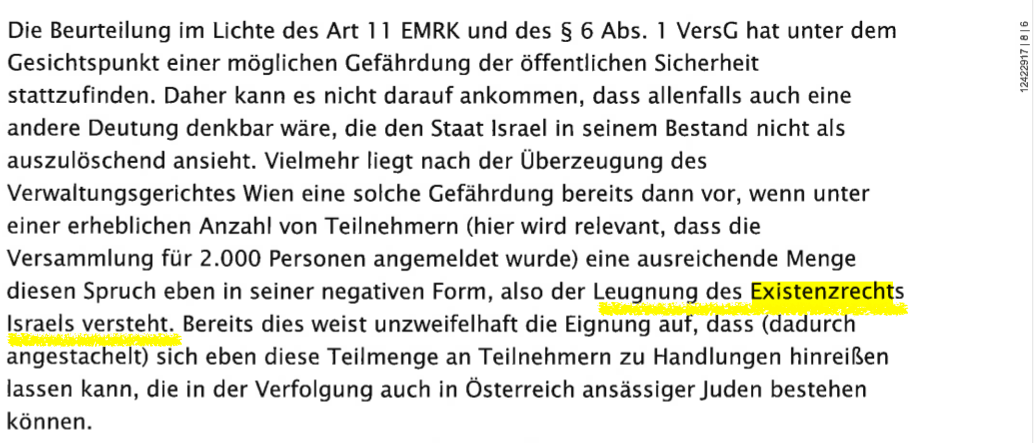
(Click for EN Translation) — Legal argumentation of the Vienna Administrative Court on behalf of the Republic on 7 April 2025
What’s fascinating about this justification, which invokes Israel’s »right to exist«, is that, unlike all other underlying arguments, this very »right to exist« of a foreign state is not substantiated by any reference to an underlying legal framework (e.g., Article 1 of the ECHR, Section 6 (1) of the Insurance Act, Article 133 (4) of the Federal Constitutional Law). As Israel’s »right to exist«, from the point of view of Austria, refers to laws applicable to a foreign state, it is entirely justified to assume it is anchored in international law.
However, the right to exist of states is not enshrined in international law, as statehood is not a legal reality, but a political one. 1 UN Special Rapporteur Francesca Albanese also pointed out this non sequitur (Latin for “it does not follow,” a fallacy within the argument) in her reply to the question of whether “Israel has a »right to exist«":
“Israel does exist […] there is no such thing in international law as a right of a state to exist. What is enshrined in international law is a right of a people to exist. The state of Israel is there; it’s protected as a member of the United Nations.” 4
Evidently there is no legal framework granting states the »right to exist« in international law. Howbeit, there is still the option of an Austrian deviation from international law, that can be used as the basis for a coherent and well-founded legal argument. To further explore this alternative, a recently published “implementation report 2023/2024 evaluating the impact of Austrias National Strategy Against Antisemitism,” that refers to Israel’s »right to exist«, seems promising:
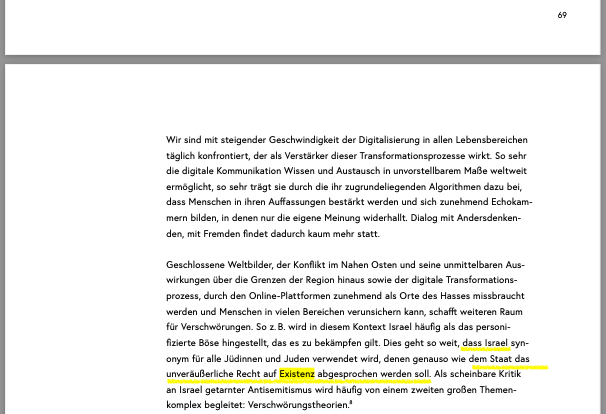
(Click for EN Translation) — Implementation Report 2023/2024 with the overall evaluation of the National Strategy against Antisemitism refers to Israel’s ‘right to exist’
However, persuing this avenue, the relevant document of the implementation report, namely the “National Strategy against Antisemitism”, is ineffectual, as it does not even mention nor refer to Israel’s »right to exist« (german: »Existenzrecht«):

National Strategy against Antisemitism (NAS) does not address Israel’s ‘right to exist’ (german:Existenzrecht)
The only occurrence of the word “exist” in the “National Strategy against Antisemitism” is in connection with the denial of the “existence” of Nazi atrocities and appears exclusively in the following section:
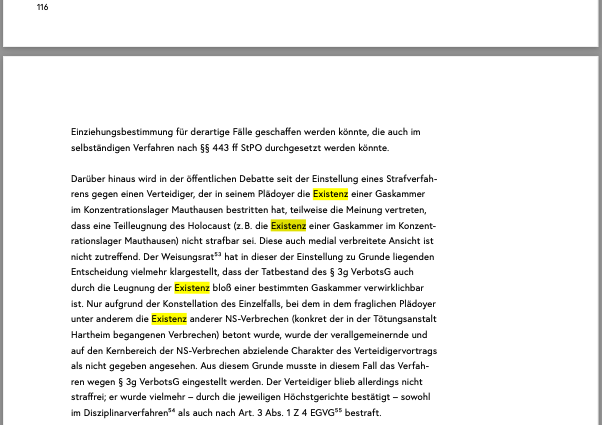
(Click for EN Translation) — National Strategy against Antisemitism (NAS) merely mentions the denial of the ‘existence’ of Nazi atrocities
Since Israel’s »right to exist« is not enshrined in the “National Strategy against Antisemitism,” the International Holocaust Remembrance Alliance (IHRA) Working Definition of Antisemitism, adopted by a Council of Ministers resolution in April 2017, serves as the next potential source.
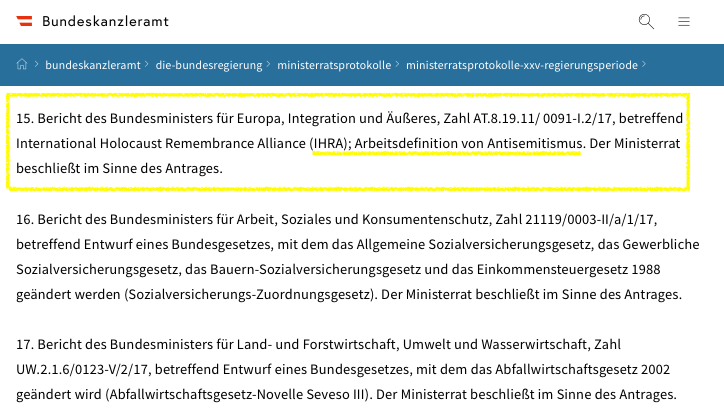
(Click for EN Translation) — Item 15 of the Council of Ministers Resolution of the 2017 International Holocaust Remembrance Alliance (IHRA) Working Definition of Antisemitism
According to the Federal Chancellery, this definition of antisemitism offers “perfectly adequate guidance on how antisemitism can manifest itself in concrete terms”:
“Antisemitism is a certain perception of Jews, which may be expressed as hatred toward Jews. Rhetorical and physical manifestations of antisemitism are directed toward Jewish or non-Jewish individuals and/or their property, toward Jewish community institutions and religious facilities.”
Antisemitism can therefore also be directed against non-Jewish individuals and/or their property. 5
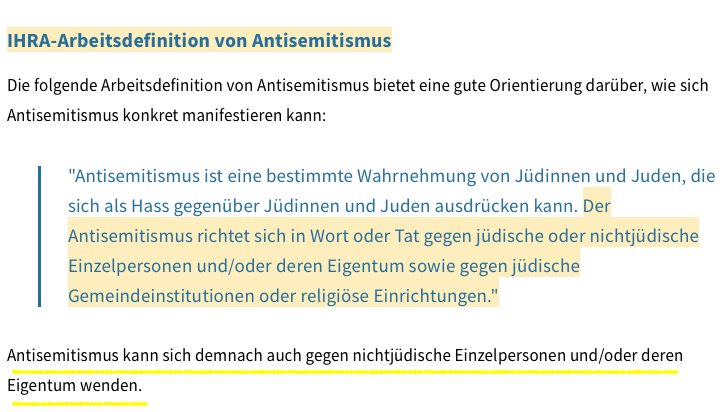
(Click for EN Translation) — International Holocaust Remembrance Alliance (IHRA) working definition of antisemitism at bundeskanzleramt.gv.at
One can only hope that criticism of Israeli settlers who, protected by the Israeli defense forces, 6 have appropriated land and property in violation of international law and now call it their “property” will not be interpreted as anti-Semitism. This interpretation would be consistent with the IHRA working definition, a circumstance that ought to be worrying and justifies its criticism 7:

Furthermore, it is elucidated that antisemitism can also be directed against the State of Israel, whereby “Israel is to be understood as a Jewish collective.” 5 Aside from the non sequitur that euqates Jews as a collective with the State of Israel, it is astonishing how little scope remains for criticism of Israel without falling into the orbit of “Israel-related antisemitism.” The Austrian government seems to be cognizant of this fact, which is why it mentions that “criticism of Israel […] is not antisemitic if it is comparable to that of other states.” 5 At this point, reference is made to the 3-D test, which, according to the Federal Government, is suitable as a means for classifying “Israel-related antisemitism”: “Is Israel demonized, delegitimized, or viewed with double standards?” In particular, the third D, referring to delegitimization, is relevant with respect to our question of Israel’s »right to exist«, because, according to the Federal Government, Israel is delegitimized precisely “when Israel’s right to exist is denied.”
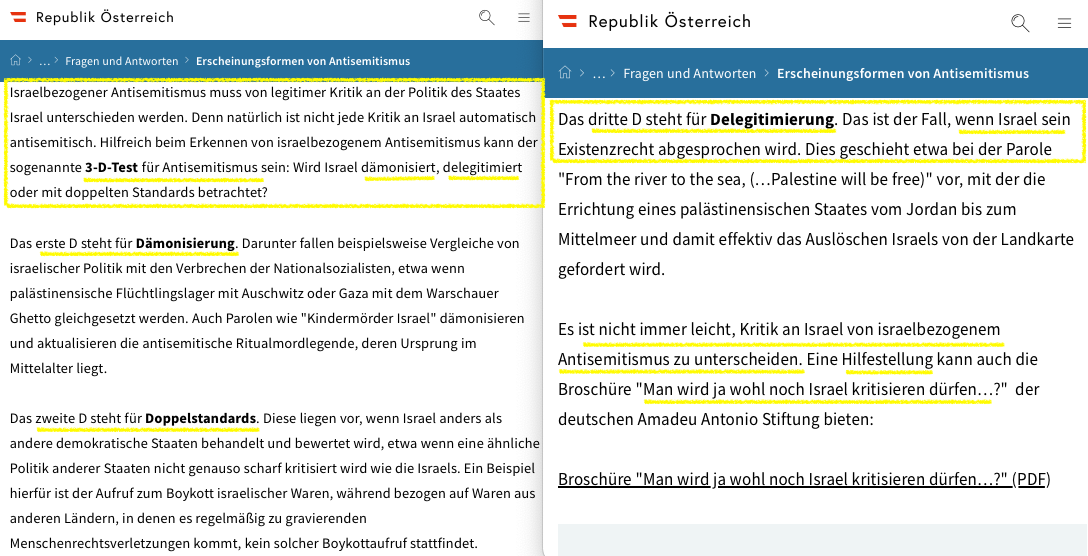
(Click for EN Translation) — According to the Austrian government, the 3-D test is intended to be suitable for classifying ‘Israel-related antisemitism’
Again, Israel’s »right to exist« is raised without specifying where this right is anchored, justified, or defined. The next source that has the potential to contain such a reference is a biennial study conducted since 2018 and published on behalf of the Austrian Parliament, attempting a “representative empirical data collection on the topic of antisemitism in Austria.” 8 In section “2.2.6 Israel-related antisemitism,” the study does reference the 3-D test, asserting Israel’s »right to exist«; howbeit, any reference to or definition of this right is once more diligently omitted:
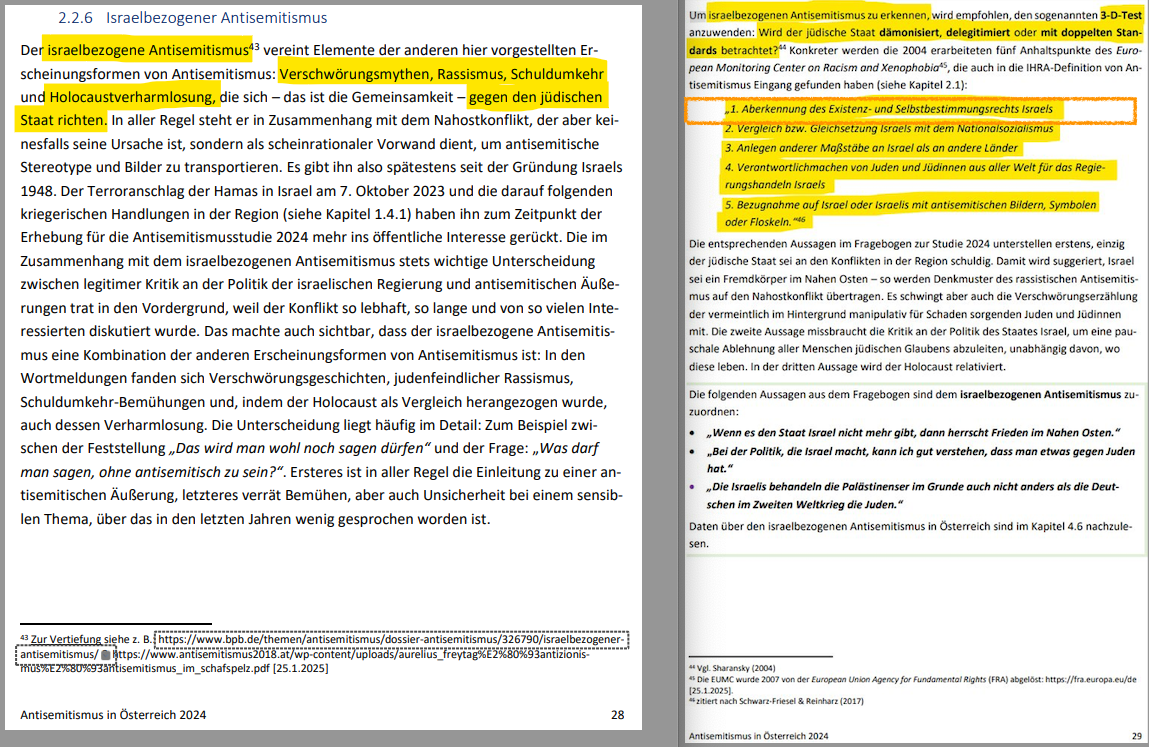
(Click for EN Translation) — Israel-related antisemitism Section of a data collection on antisemitism in Austria on parlament.gv.at
“To further substantiate” 8 the topic of “Israel-related antisemitism,” a 27-page document entitled “Anti-Zionism – Antisemitism in Sheep’s Clothing?” 9 is cited, inter alia, commissioned by the President of the National Council in 2019 and touted as a guideline for classifying “Israel-related antisemitism.” This work lists examples of statements “that Monika Schwarz-Friesel and Jehuda Reinharz collected in 14,000 emails and letters to the Central Council of Jews and the Israeli Embassy in Germany that they analyzed” 9 and classify as “antisemitic.”
According to its author, statements such as the following are considered anti-Semitic:
„We are outraged by Israel’s aggressive policies. This state is a grave threat to world peace.“
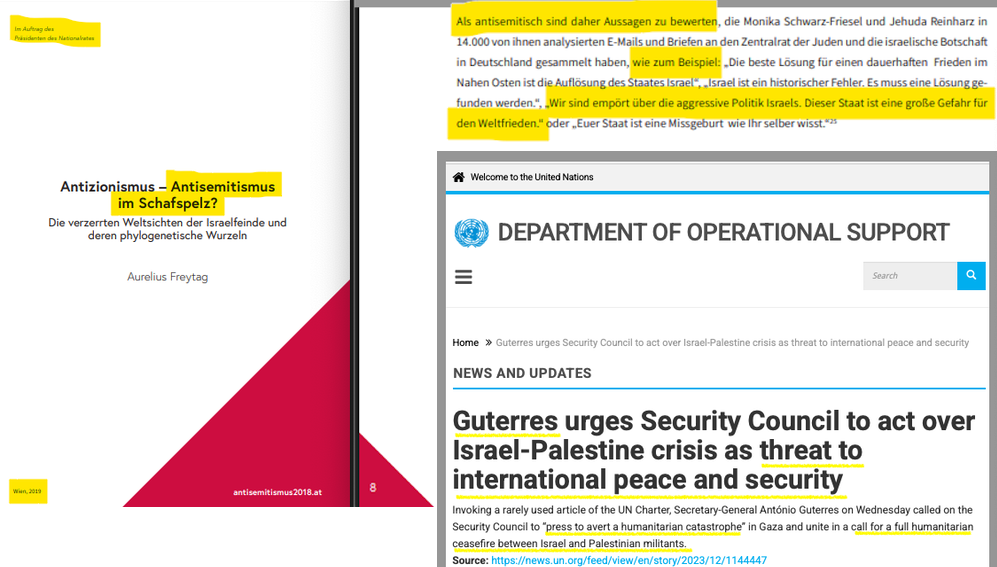
(Click for EN Translation) — According to the document ‘Anti-Zionism – Antisemitism in Sheep’s Clothing’, it is «Antisemitic to describe Israel as a major threat to world peace» — António Guterres describes the Israel-Palestine crisis as a «threat to international peace».
If such examples are consistently applied as a model for assessing antisemitism, António Guterres, Secretary-General of the United Nations, must also be considered antisemitic with his call to the United Nations Security Council “to act in light of the Israel-Palestine crisis as a threat to international peace and security” and “to urge the averting of a humanitarian catastrophe in Gaza” 10; a conclusion that, while consistent with Freytag’s example, cannot be supported by any rational argument and is therefore simply ludicrous, yet is nevertheless asserted by Israeli Foreign Minister Israel Katz. 11
The following statements also stand in stark contrast to reality:
„You should be ashamed of belonging to a terrorist state that liquidates its opponents and innocents with rocket attacks.“
„We are talking about a brutal, racist apartheid state.“

(Click for EN Translation) — According to the document Anti-Zionism – Anti-Semitism in Sheep’s Clothing, it is «‘antisemitic’ to describe Israel as a terrorist apartheid state» — the Israeli newspaper Haaretz describes Israel as an «apartheid regime» whose actions amount to «state terror».
Freytag, the study’s author, regurgitates a selection of samples that classify calling Israel a “terror state” or even a “racist apartheid state” as antisemitic, notwithstanding the consensus by Israeli newspapers that designate Israel’s actions as state terror, 12 writing years before October 7, 2023, that “it is time to recognize that Israel is an apartheid regime,” 13 not to mention human rights organizations such as Amnesty International, Human Rights Watch, 14 B’Tselem (Israeli Information Center for Human Rights in the Occupied Territories) and many others, as well as the United Nations, which have been denouncing this situation for years.
As in the previous document, Israel’s «right to exist», whose legal legitimacy serves as the impetus of this analysis, is yet again only mentioned obliquely via the 3-D test, as follows:
„The delegitimization test questions whether criticism of Israel denies it its right to exist. […] Where, of course, Israel is denied its right to exist or its right to self-defense, criticism “of Israel” has undoubtedly crossed the line into anti-Semitism.“
Once again, Israel’s «right to exist» is assumed as a presupposition, explaining why references to a legally recognized framework defining this very right are sedulously omitted. To support this presumption and understand how such a glaring omission remains unrecognized by the author, the following two quotations, serve as the prelude and ideological foundation to Freytag’s analysis 9:

According to the document ‘Anti-Zionism – Anti-Semitism in Sheep’s Clothing’ — Introductory quotes from Theodor Herzl and Hans Mayer.
„Everywhere we have genuinely tried to blend into the community around us and to preserve only the faith of our fathers. They won’t allow it. (…) So it’s in vain that we are brave patriots everywhere, like the Huguenots who were forced to migrate. If only we were left alone… But I don’t think we will be left alone.“ — Theodor Herzl
The first quote by Theodor Herzl exhibits a level self-awareness that indirectly, yet distinctly, chronicles that even he was aware that the narrative of the “wandering, brave patriot” desperately trying to reconquer the Holy Land inevitably results in “not leaving alone” those who have built their livelihoods in the region. In other words, the consequences of settler colonialism, 15 the most vicious form of imperial conquest, were evident to him, which is why he consequently expressed concern that the original inhabitants of the region would not acquiesce and tacitly accept their expulsion, resisting the settlers along with their descendants.
„Anyone attacking ‘Zionism’ whilst eschewing to say anything against the ‘Jews’ is deluding themselves or others. The State of Israel is a Jewish state. Anyone who wants to destroy it, either explicitly or through a policy that can achieve nothing other than such destruction, is pursuing the hatred of Jews of the past and of all time.“ — Hans Mayer
The second quote from Hans Mayer polemically equates “Zionism” with “Judaism” and, as a consequence, proclaims the “State of Israel [to be] a Jewish state.” Aside from the fact that many Jews reject the equation of their religion with Zionist ideology, the fusion of “Zionism” with “Judaism” desired by Mayer is not only incoherent, but also an outcome that, in other forms, is vehemently rejected and denounced as ludicrous. No one, for example, would seriously claim to equate the ideology of “capitalism” with “Christianity” or “mercantilism” with “Islam.” Both citations that Aurelius Freytag quotes as an introduction to his work presuppose Israel’s «right to exist» as an irrefutable basic assumption, likely explaining the reason for the absence of a coherent argument and references to this proclaimed right.
Resolution 181 (II) of the UN General Assembly on the future government of Palestine is another document commonly cited in discussions as the basis for Israel’s «right to exist». This resolution defines how the British occupier 16 (i.e., euphemistically called the “mandate holder”) is to divide the occupied (i.e., euphemistically referred to as “mandated”) territory. That is, it describes the partition (division or dismemberment) of the region. The «right to exist» of the State of Israel is not addressed.
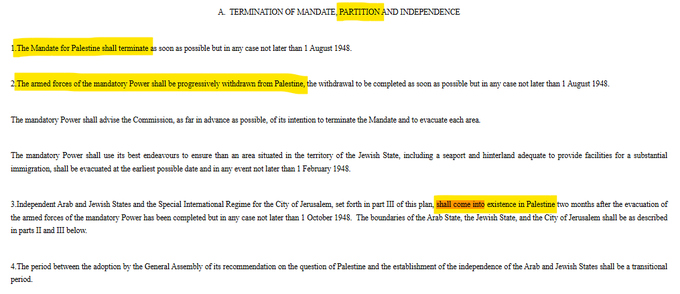
Partition plan for Palestine with economic union – UN General Assembly Resolution 181 (II) on the Future Government of Palestine.
Another line of argument for Israel’s «right to exist» is based on the idea that “Jews need a land because they are a nation charged with bringing the Divine Presence down to earth in the shared spaces of our collective life,” 17 and thus follow a “divine plan.” This “biblical right to exist” is often postulated as a rhetorical question to Jews, Christians, and Muslims as follows:
“If you believe in the God of Abraham, grant that the children of Abraham have a right to the Land that the God in whom you believe promised them, and to which He promised them that after exile they would return.” 17
However, an appeal to biblical rights is incoherent, since in a legal context, the term “biblical rights” has no direct legal effect. While the Bible and religious texts can influence moral and ethical frameworks, they are not considered a source of enforceable legal claims. 18 This is due, inter alia, to the fact that the Austrian state relies on certain fundamental rights and principles with regard to religious practice, such as the principle of secularity, which means that the state has exclusively secular and earthly tasks and goals, as well as the principle of religious neutrality, which in turn means that the “Austrian legal system is religiously neutral and does not identify with any particular church or religious community.”

Fundamental rights regarding religious practice — principle of religious neutrality and the principle of secularity.
The origins of the term Israel’s «right to exist» date back to the 1970s. When Jimmy Carter took office as US president in 1977, he had an ambitious plan to advance a comprehensive Arab-Israeli peace process that would guarantee the Palestinians a state and their rights. However, this process foundered over the next three years. The first setback came four months after Carter took office. For the first time, Israeli voters handed control of the Knesset to a right-wing government led by the new Prime Minister, Menachem Begin. Begin pursued a hard line in the “peace process,” and his refusal to make concessions made the conclusion of a regional agreement difficult. 19 Not only did Israel refuse to make concessions, but to prevent a diplomatic solution, it was forced to raise the stakes by making Israel’s recognition of its «right to exist» a condition. However, this «right to exist» is an invention of American-Israeli propaganda 20 citing the wording of UN Resolution 242, in particular the following clause: 20
“Termination of all claims or states of belligerency and respect for and acknowledgement of the sovereignty, territorial integrity and political independence of every State in the area and their right to live in peace within secure and recognized boundaries free from threats or acts of force;” 21
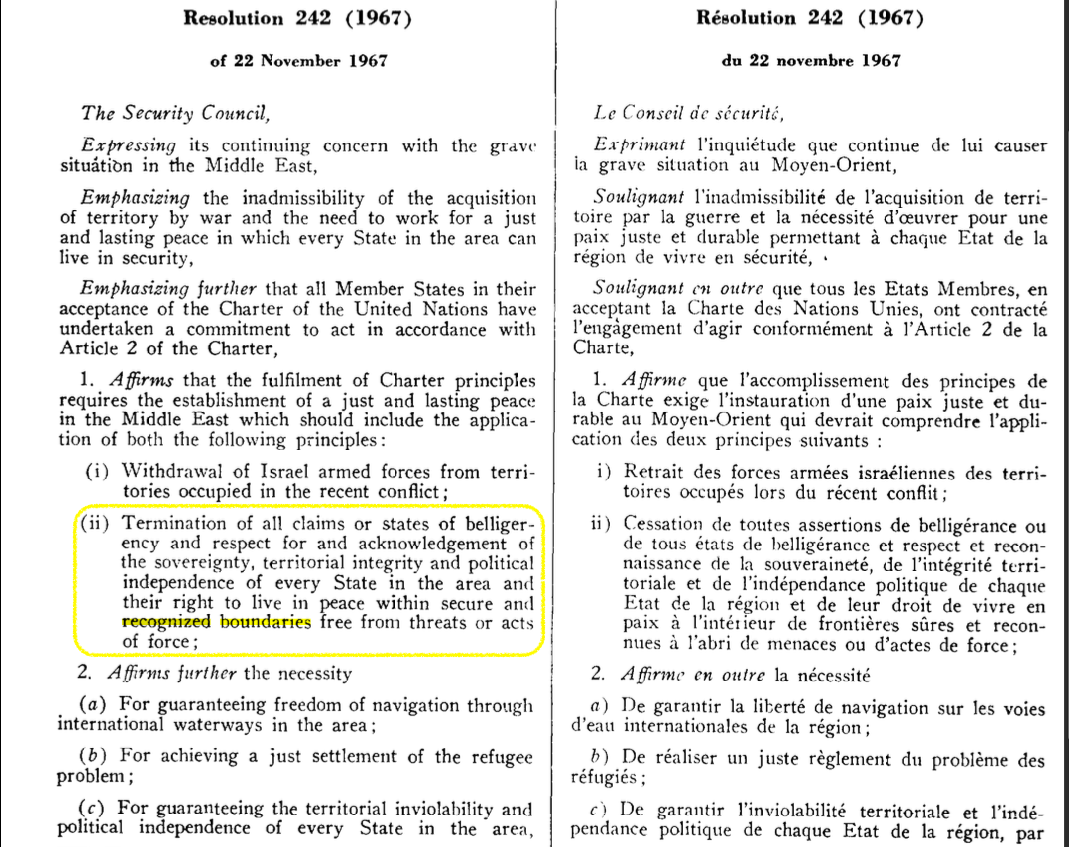
The origin of the invention of the term „Israel’s «right to exist»“ in American-Israeli propaganda lies in UN Resolution 242 and the right of Israel to “live in peace within secure and recognized borders free from threats or acts of violence”.
Initially, Israel supported this resolution as it called on Arab states to recognize Israel’s right “to live in peace within secure and recognized boundaries, free from threats and acts of force.” All Arab states eventually accepted it. Egypt and Jordan accepted the resolution from the outset because it called for Israel’s withdrawal from the territories occupied in the conflict. The Palestine Liberation Organization (PLO) opposed the resolution until 1988 because it made no explicit references to the Palestinians. The US and Israel, of course, understood that there was no reason why the Palestinians should recognize the legitimacy of their dispossession. 20 Although it was never fully implemented, it formed the basis of diplomatic efforts to resolve the Arab-Israeli conflicts until the Camp David Accords.
This fact is also confirmed, somewhat obscured, in the German entry on Wikipedia on “Israel’s right to exist”:
“However, it was only in relation to this one state Israel that the fixed expression “Israel’s right to exist” emerged in the 1970s, because from the very beginning this was questioned particularly frequently and persistently.” — Wikipedia retrieved Jun.2, 2025
Note that this only refers to the emergence of a “fixed expression of Israel’s «right to exist».”

The “Israel’s Right to Exist” Wikipedia entry refers only to the emergence of a ‘fixed expression «Israel’s Right to Exist»’.
No state has a right to exist, nor is any state granted such a right, nor should it be granted one. Mexico recognizes the United States, but not its «right to exist» sitting on half of Mexico, which was conquered in an aggressive war. 22 The German Democratic Republic (GDR; german acronym: DDR) and the Federal Republic of Germany (FRG; german acronym: BRD) also had no «right to exist», and no one would consider challenging German reunification based on this ground. Czechoslovakia ceased to exist in 1992; again, no reference to a violation of Czechoslovakia’s «right to exist» can to be found in this context.
Ultimately, a question regarding the authority to administer justice, i.e., jurisdiction, arises, with respect to a states purported «right to exist». Jurisdiction, in turn, is tied to positive law, i.e., “law established by man.” 23 “The concept of positive law only acquires its meaning against the background of natural law as its opposite concept.” 24 The latter is merely discovered by man, while the former, positive law, is created by man. Now, if, purely hypothetically, Israel’s «right to exist» existed in a legal positivist sense, the question of the judicial instance and the organization charged with executing the judgment and its power body would be relevant. In the case of Israel, however, this question is irrelevant, since Israel neither recognizes the International Court of Justice (ICJ) nor the International Criminal Court (ICC) (it originally agreed to the ICC Statute but later withdrew its signature, thus is not a member of the ICC and consequently does not consent to its jurisdiction), thus demonstrating that it does not value a «right to exist» in this regard.
With regard to the situation in Austria, it ought to be noted, based on the German “raison d’état” (reason of state; german: “Staatsräson”), that the term “Israel’s «right to exist»” is not a term of Austrian law, but rather describes a guiding political principle that establishes neither rights nor obligations. However, it has found expression in legal norms prohibiting antisemitic acts and, especially after October 7, 2023, has regained relevance in the Austrian public, as “political Austria” has increasingly reaffirmed its commitment to Israel’s existence and security.
Rhetorical question:
Can violations of an alleged right, which is neither enshrined in international law nor in the terminology of Austrian law, be used as a basis for canceling assemblies? Or does this constitute a violation of the freedom of assembly, a fundamental right?
Notes
📚 Gershom Gorenberg, The Unmaking of Israel, Harper, Nov.8, 2011.
📺 Jonathan Ofir speaks out on Israel’s oft-claimed ‘right to exist’, and how current realities will put that supposed axiom into question:
References
-
Moncef Khane, No state has an inherent ‘right to exist’, not even Israel, Al Jazeera, Nov.5, 2024. ↩︎
-
Hostilities in the Gaza Strip and Israel | Flash Update #11, UNOCHA, Oct.17, 2023. ↩︎
-
Entschließungsanträge im Nationalrat, Österreichisches Parlament, retrieved May.15, 2025. ↩︎
-
Bernadette Zaydan, Does Israel have a right to exist? The impact of Statehood, Pearls and Irritations — John Menadue’s Public Policy Journal , Dec.22, 2024. ↩︎
-
IHRA-Arbeitsdefinition von Antisemitismus, Bundeskanzleramt.gv.at, retrieved May.24, 2025. ↩︎
-
Hagar Shezaf, Israeli Settlers Recruit Reservists to Guard West Bank Outposts and Help Form New Ones, Haaretz, Oct.20, 2024. ↩︎
-
Amos Goldberg: »Es geht heute nicht um Israels ›Existenzrecht‹«, nd—Journalismus von Links, May.23, 2025. ↩︎
-
Antisemitismus 2024 Gesamtergebnisse - Langbericht, Studie im Auftrag des österreichischen Parlaments Wien, Mar 2025. ↩︎
-
Aurelius Freytag, Antizionismus — Antisemitismus im Schafspelz?, Im Auftrag des Präsidenten des Nationalrates, 2019. ↩︎
-
Guterres urges Security Council to act over Israel-Palestine crisis as threat to international peace and security, UN, retrieved May.26, 2025. ↩︎
-
Toi Staff, FM Katz: Under Guterres, UN has become ‘antisemitic, anti-Israel body’ that ’emboldens terror’, The Times of Israel, Mar.23, 2024. ↩︎
-
B.Michael, Israel Is Bringing Its State Terrorism From Gaza and the West Bank to Lebanon, Haaretz, Sep.24, 2024. ↩︎
-
Yehudit Karp, The Time Has Come to Admit: Israel Is an Apartheid Regime, Haaretz, Oct.11, 2021. ↩︎
-
Omar Shakir, Israeli Apartheid: “A Threshold Crossed”, Zenith Magazine, Jul.19, 2021. ↩︎
-
Ofer Aderet, ‘Place the Material in the Wells’: Docs Point to Israeli Army’s 1948 Biological Warfare, Haaretz, Oct.14, 2022. ↩︎
-
Patrick Terry, Britain in Palestine (1917-1948) - Occupation, the Palestine Mandate, and International Law, University of Bologna Law Review Vol.2 No.2 (2017). ↩︎
-
Jeffrey Levine, Does Israel have the right to exist?, The Times of Israel, May.8, 2024. ↩︎
-
Ian Buruma, Die Argumente für den Staat Israel bleiben gültig, DiePresse, Nov.4, 2024. ↩︎
-
Benjamin Allison, How U.S. Failures in the 1970s Contributed to the Israel-Hamas War, Time, Nov.17, 2023. ↩︎
-
Philip Weiss, Chomsky on Israel’s ‘Right to Exist’, Mondoweiss, Jun.26, 2007. ↩︎
-
UN Resolution 242 (1967), United Nations Security Council, Nov.22, 1967. ↩︎
-
Noam Chomsky interviewed by Brown Political Review, Brown Political Review, Nov.19, 2014. ↩︎
-
Elmar Waibl, Franz Josef Rainer, Basiswissen Philosophie. facultas.wuv, Wien 2007, Nr. 864. ↩︎
-
Klaus Röhl, Hans Christian Röhl, Allgemeine Rechtslehre, Vahlen, Dec.31, 2021. ↩︎